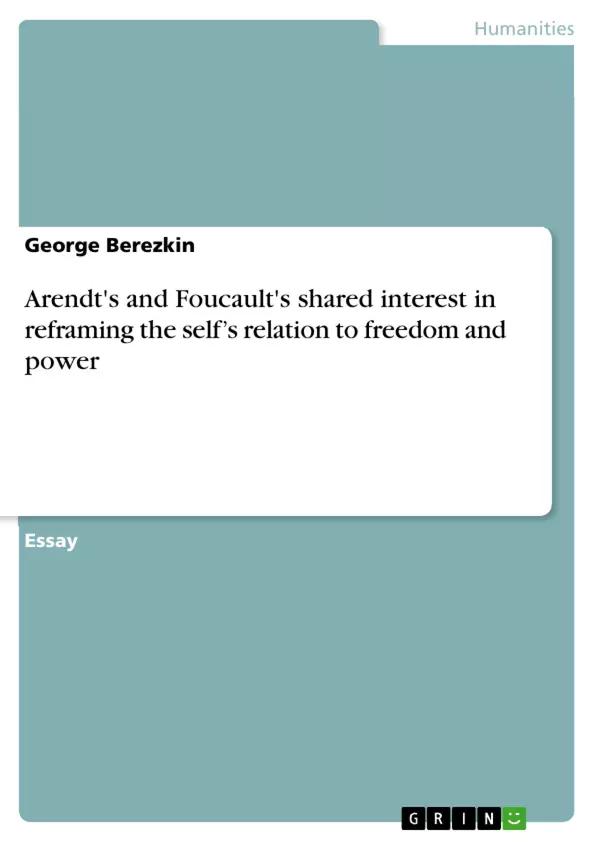The statement argues that the both mentioned authors only share the intent of reconceptualising freedom and power in respect to the self, thereby insinuating that their actual understandings of these concept varies quite significantly. It also assumes the political and philosophical projects of either author represent a separate duality, thereby delinking the philosophical and political from each other and representing them as singular categories independent from each other. Arendt argues that this view represents one of the oldest western traditions of political thought:
‘The gulf between philosophy and politics opened historically with the trial and condemnation of Socrates, which in the history of political thought plays the same role of a turning point that the trial of Jesus play in the history of religion’ (Arendt 1990: P.73)
After the trial, Plato became disillusioned with the merits of politics for philosophers and heralded the age apolitia – arguing for the disengagement of philosophy from politics, which resulted in the separation of thought from action (Arendt 1990: P. 92). Arendt forcefully rejected such division of philosophy and politics, which Minnich (1989: P. 133) explains by Arendt’s personal experience of the rise of Hitler and the ‘inner emigration’(Arendt 1968: P. 19) of professional thinkers, who according to her by withholding judgement became implicit collaborators (Arendt 2000a; 2003; 2006). This idea represents her key thesis of the banality of evil.
Similarly Foucault digresses from the viewpoint that philosophy and politics are independent entities and argues for a political philosophy that can answer ‘how (..) the discourse of truth, or quite simply, philosophy as that discourse which par excellence is concerned with truth, (is) able to fix limits to the rights of power?’(italics in original)(Foucault 1980: P.93) Thereby actively attempting constrain political power through philosophical reflection, similarly to Arendt.
This essay will thereby first and foremost look at the philosophical projects of both authors and their political effects, because they form a political philosophy and seeing them as separate is not helpful. The two categories need to be instead seen as related, where the analysis of the former - philosophy has direct effects on our process and understanding of the latter - politics.
Inhaltsverzeichnis (Table of Contents)
- Arendt and the Self?
- Power and the Self
- Freedom? And the Self
- Political Philosophy
- Conclusion
- Bibliography
Zielsetzung und Themenschwerpunkte (Objectives and Key Themes)
This essay examines the relationship between freedom, power, and the self in the works of Hannah Arendt and Michel Foucault. The author argues that while both thinkers share an interest in re-evaluating these concepts, their philosophical and political projects diverge significantly. The essay aims to analyze both Arendt's and Foucault's conceptions of these concepts, exploring their interconnectedness and impact on political philosophy.
- The relationship between freedom and power in the context of the self
- The influence of philosophical thought on political structures and practices
- The role of individual agency and collective action in shaping power relations
- The significance of natality and uniqueness in Arendt's understanding of the self
- The pervasive nature of power and its implications for individual autonomy
Zusammenfassung der Kapitel (Chapter Summaries)
- Arendt and the Self? This chapter challenges the notion that Arendt lacked a theory of the self. It argues that her conception of the self is rooted in the concept of natality, emphasizing individual uniqueness and potential for action. The chapter highlights Arendt's emphasis on the public realm as the space where individuals act and form their identities.
- Power and the Self: This chapter delves into the concept of power in the works of both Arendt and Foucault. It explores their shared understanding of power as a ubiquitous force, embedded in social relations and shaping individual identities. The chapter explores the tension between agency and the pervasive influence of power structures.
Schlüsselwörter (Keywords)
This essay focuses on key concepts such as power, freedom, the self, political philosophy, natality, agency, action, and the public realm. It analyzes the interconnectedness of these concepts in the works of Hannah Arendt and Michel Foucault, highlighting their shared concerns and diverging perspectives on the relationship between philosophy and politics.
Frequently Asked Questions
What is Hannah Arendt's concept of "natality"?
Natality refers to the uniqueness of every individual and their inherent potential to start something new through action in the public realm.
How do Arendt and Foucault differ in their view of power?
While both see power as pervasive, Arendt emphasizes power as something created through collective action, whereas Foucault focuses on power as a disciplinary force shaping the self.
What is the "banality of evil" in Arendt's work?
It describes how ordinary people can participate in horrific crimes by withholding judgment and following orders without critical thought.
Why does the essay link philosophy and politics?
The author argues that philosophical reflection directly affects our understanding of political processes and that separating them is unhelpful for modern analysis.
What role does the "public realm" play for the self?
For Arendt, the public realm is the essential space where individuals act, reveal their identities, and exercise their freedom.
- Quote paper
- George Berezkin (Author), 2015, Arendt's and Foucault's shared interest in reframing the self’s relation to freedom and power, Munich, GRIN Verlag, https://www.grin.com/document/314859



